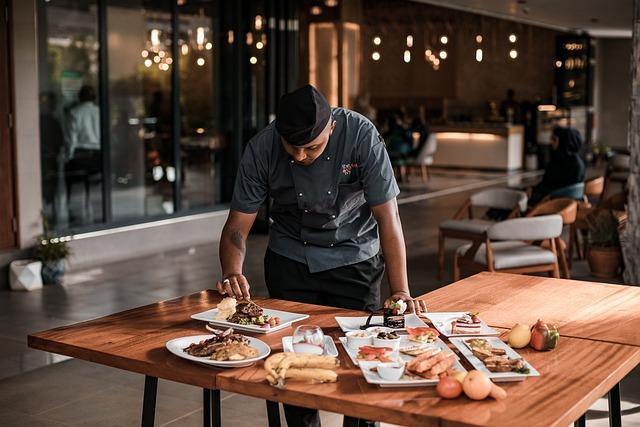In recent years, the trend of hiring private chefs has surged among affluent households, promising the luxury of personalized culinary experiences within the comfort of one’s home. However, beneath the allure of gourmet meals and bespoke dining lies a potential pitfall: the inadvertent cultivation of unhealthy eating habits. This article delves into the complexities surrounding the integration of private chefs into family dynamics, examining how the convenience and indulgence they offer may lead to dietary imbalances and a disconnection from traditional family meal practices. By analyzing nutritional data, family behavior patterns, and expert opinions, we aim to uncover the subtle yet significant impact of this modern dining phenomenon on family health and well-being.
The hidden nutritional pitfalls of relying on private chefs
While hiring a private chef may seem like the ultimate luxury for convenience and culinary excellence, it can also mask certain nutritional downsides that can lead to unhealthy family eating habits. One significant concern is the potential lack of control over ingredient choices. Many families may not scrutinize the chef’s selections as closely as they would their own, leading to an increase in processed ingredients or hidden sugars and salts in everyday meals. Over time, this can contribute to poor dietary patterns, even when dishes are visually appealing and seemingly healthy.
Moreover, reliance on private chefs can inadvertently discourage family members from engaging with the cooking process, missing out on educational opportunities to learn about nutrition and meal preparation. This detachment can foster a disconnection from understanding what constitutes a balanced diet. Additionally, families might become accustomed to rich, gourmet-style meals that are more calorically dense than typical home-cooked meals. Potential pitfalls include:
- Overconsumption of rich sauces and dressings
- Increased portion sizes due to gourmet presentation
- Reduced intake of whole, unprocessed foods
By being aware of these hidden pitfalls, families can take steps to ensure that their private chef’s culinary skills are balanced with nutritional mindfulness.

How convenience in the kitchen compromises family health
In the modern age of convenience, the allure of hiring a private chef can be quite tempting. However, this seemingly luxurious choice often results in unintended consequences for family health. One major concern is the lack of involvement in meal preparation. When a private chef takes over the kitchen, family members miss out on the valuable opportunity to learn about nutrition, portion control, and the importance of fresh ingredients. This detachment can lead to a disconnect between what is consumed and its nutritional value, fostering an environment where unhealthy eating habits may thrive.
- Processed Ingredients: To cater to diverse palates and simplify meal preparation, chefs might resort to using processed foods that are high in sodium and preservatives.
- Loss of Tradition: Families may lose touch with traditional recipes and cooking methods, which often emphasize wholesome, home-cooked meals.
- Portion Sizes: With a professional in charge, portion sizes can be inconsistent, leading to overeating or undernutrition.
Furthermore, dependency on external culinary expertise can diminish the intrinsic value of family mealtime. This ritual, essential for fostering communication and bonding, becomes a mere formality rather than a cherished event. The absence of collective decision-making about meals may also mean that individual dietary needs and preferences are overlooked, resulting in a one-size-fits-all approach to eating that might not suit everyone’s health requirements. While the convenience of a private chef is undeniable, it is crucial to weigh these benefits against the potential drawbacks to family health and dynamics.

Understanding the psychological impacts of outsourcing meal preparation
Outsourcing meal preparation by hiring private chefs can inadvertently alter the psychological dynamics within a family. The act of cooking together is more than just a daily chore; it is a bonding ritual that fosters communication, collaboration, and shared responsibilities. When this activity is delegated to an outsider, families might miss out on these crucial interactions, leading to a sense of detachment. Children, in particular, lose the opportunity to learn essential life skills and develop a healthy relationship with food, which is often cultivated through hands-on experiences and parental guidance in the kitchen.
Moreover, entrusting meal preparation to a professional can create an environment where food becomes more of a transaction than an experience. This shift can lead to several unhealthy eating habits, such as:
- Reduced awareness of food choices and portions, as meals are crafted without family involvement.
- Less appreciation for the time and effort involved in meal preparation, potentially fostering a lack of gratitude and understanding.
- Increased reliance on chef-prepared meals, which might not always align with the family’s nutritional needs or preferences.
Ultimately, the psychological impacts of outsourcing meal preparation can ripple through the family structure, affecting how members perceive food, relationships, and their roles within the household.
Strategies for promoting healthier eating habits with private chef services
While hiring a private chef may seem like a luxury that could lead to indulgent dining, it can actually be leveraged to foster healthier eating habits. By collaborating with a private chef, families can curate a personalized meal plan that emphasizes nutritious ingredients and balanced meals. This tailored approach allows for the incorporation of fresh produce, whole grains, and lean proteins into daily menus, encouraging healthier eating patterns.
- Customized Menus: Work with the chef to create menus that focus on healthy, seasonal ingredients. This ensures meals are not only delicious but also nutrient-dense.
- Education and Involvement: Encourage the chef to involve family members in the cooking process, providing education on nutrition and cooking techniques.
- Portion Control: Benefit from the chef’s expertise in portion sizes to prevent overeating and maintain a balanced diet.
- Dietary Adjustments: Address specific dietary needs or preferences, such as gluten-free, vegetarian, or low-sodium options, with the chef’s assistance.



